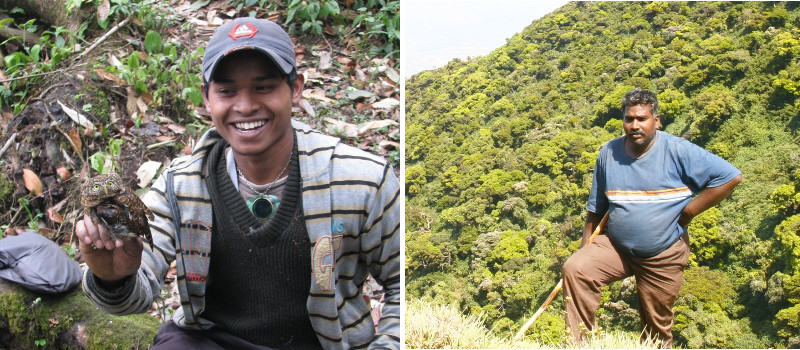Field staff policy
Tue, 2021-08-31 11:45
| Dinesh Subba has been working on the Arunachal Pradesh long-term bird project on bird demography since 2011 | Mayavan has been working in the Nilgiris since the 1990s and has assisted a range of researchers from CES as well as other organisations. |
Field Staff at CES
As a discipline, ecology requires data collection in the field, across a range of challenging conditions, and often in remote areas. A majority of students and faculty at CES collect data for theses/publications through fieldwork. These data can only be collected in the field, and without these data, cutting-edge research in ecology at par with the highest global standards would be impossible. Field data collection hinges critically on Field Staff with highly specialised skill sets.
CES would like to highlight the key role that Field Staff play in our research. We recognize that this is also true for field biologists at various government and non-government institutions across the country.
1. Field Staff skills
(a) Indispensable knowledge
At our study sites, Field Staff are employed by CES researchers because of their indigenous knowledge and skills acquired from living in close proximity to natural habitats, in many cases for decades or longer. These include an intimate knowledge of landscapes/seascapes and their species. This knowledge is critical to high-quality research (appropriate site selection and study design, species identification, etc). Familiarity with habitats and species and field-related research skills cannot be taught formally through any academic programme. Their knowledge often provides insights that makes them collaborators in research to the extent that there is a growing movement to credit them as co-authors in publications.
(b) Safety and logistics
Students and researchers in the field work in a range of conditions; navigate on foot across unknown forests and mountain landscapes, make journeys between islands on country boats, camp in remote areas with no access to mobile networks and work in the presence of potentially dangerous animals such as elephants. We entrust the safety of these researchers with complete confidence to our Field Staff because of their familiarity with potential risks, and their ability to anticipate and overcome such risks. Their importance to ensuring the safety of our students and other research staff cannot be overstated.
(c) Long term engagement
In many cases, CES Field Staff have continued to work on research programmes for decades. During this time, they develop a wide range of specialized skills (e.g., vegetation and animal monitoring, camera trapping, radio-telemetry, handling and measurement of wildlife). Trained Field Staff are especially indispensable for high-impact long-term research over large spatial scales.
2. Formal qualifications
Field Staff often do not have higher academic qualifications (most are likely to have had little to no schooling). Their lack of degrees in no way detracts from the critical contributions they are able to make to the field of ecology.
3. Recommended actions
(a) Respect
We would like to emphasize that Field Staff should be treated as colleagues and collaborators. Given their irreplaceable and invaluable contributions to field ecology, we believe that they should be formally employed by institutions rather than being hired on an ad-hoc basis, and receive benefits such as health and life insurance. This is already practiced in many non-government organisations and should extend eventually to other organisations as well.
(b) Co-authorship
In many instances, Field Staff may have made sufficient contribution to warrant authorship on publications. Given general publication norms, which require that all authors have read the paper, we recognize that this might not be straightforward. Furthermore, these may or may not be the sort of recognition or benefit that Field Staff are looking for. However, in the spirit of acknowledging their key contributions to science, we urge that the inclusion of field staff as co-authors on publications be given serious consideration wherever applicable and possible.
(c) Remuneration
Field staff should receive remuneration commensurate with their experience.
For more on field staff, see below:
Shifting Our Gaze – Towards a Just, Inclusive Approach to Research in the Field
Current Conservation Special Issue on Field Staff
How a love for animals spurred a change in career
